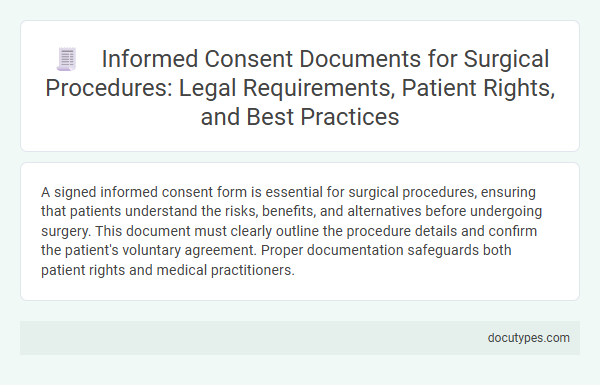A signed informed consent form is essential for surgical procedures, ensuring that patients understand the risks, benefits, and alternatives before undergoing surgery. This document must clearly outline the procedure details and confirm the patient's voluntary agreement. Proper documentation safeguards both patient rights and medical practitioners.
Introduction to Informed Consent in Surgical Procedures
Informed consent is a critical document required before any surgical procedure, ensuring patients understand the risks, benefits, and alternatives. This legal and ethical requirement protects both the patient and healthcare provider by promoting transparent communication.
You must receive and sign an informed consent form that outlines the surgical procedure in detail, including potential complications and expected outcomes. The document confirms that you have been thoroughly informed and voluntarily agree to proceed. Surgeons, anesthesiologists, and other healthcare professionals all contribute to providing the necessary information for this consent.
Legal Framework Governing Informed Consent
Informed consent is a crucial legal requirement ensuring patients understand the risks and benefits before undergoing surgical procedures. The legal framework mandates documentation that confirms the patient's voluntary agreement after adequate information disclosure.
- Informed Consent Form - A detailed document outlining the procedure, risks, benefits, and alternatives that the patient signs to authorize surgery.
- Patient Information Sheets - Supplementary materials provided to patients, explaining the surgical process and potential outcomes in accessible language.
- Legal Regulations and Standards - National and regional laws, such as the Health Care Consent Acts, govern the requirements and enforce the validity of informed consent documentation.
Essential Elements of Informed Consent Documents
What document is required for informed surgical procedures? The essential document is the informed consent form, which ensures that you understand the risks, benefits, and alternatives of the surgery. This form must contain clear information to support your autonomous decision-making.
What are the essential elements of informed consent documents? Key components include a detailed explanation of the procedure, potential risks, expected benefits, and available alternatives. The document must also confirm your voluntary agreement and provide space for your signature.
Patient Rights in the Consent Process
Informed surgical procedures require specific documentation to ensure patient rights are respected throughout the consent process. Proper documentation safeguards both the patient's autonomy and the medical provider's legal compliance.
- Informed Consent Form - This document details the surgical procedure, potential risks, benefits, and alternatives, ensuring the patient comprehends all essential information.
- Patient Information Sheet - Provides clear explanations of preoperative and postoperative care to empower the patient's understanding and decision-making.
- Proof of Competency - Confirms the patient's ability to understand and voluntarily consent without coercion or impairment.
Accurate and thorough documentation of the consent process confirms respect for patient rights and supports ethical surgical practice.
Physician and Healthcare Provider Responsibilities
Physicians and healthcare providers are responsible for obtaining informed consent before any surgical procedure. This document must clearly explain the risks, benefits, and alternatives, ensuring the patient understands their treatment options. Your signed consent form serves as legal and ethical proof that the patient agrees to proceed with the surgery after being fully informed.
Addressing Language and Cultural Barriers
Informed surgical procedures require a signed consent document that clearly explains the risks, benefits, and alternatives in a language you understand. Medical providers must offer translated materials or professional interpreters to overcome language and cultural barriers effectively. Ensuring comprehension protects patient rights and promotes safer surgical outcomes.
Documentation Standards and Record Keeping
Informed surgical procedures require comprehensive documentation to ensure patient safety and legal compliance. Essential documents include the informed consent form detailing the procedure risks, benefits, and alternatives.
Accurate record keeping must follow medical documentation standards such as date, time, surgeon's name, and patient details. You should maintain these records securely for future reference and audit purposes.
Managing High-Risk or Complex Surgical Consents
| Document Type | Description | Importance in High-Risk or Complex Surgeries |
|---|---|---|
| Informed Consent Form | A detailed document explaining the surgical procedure, potential risks, benefits, and alternatives. It must be signed by the patient or their legal representative before surgery. | Essential for high-risk surgeries to ensure the patient comprehends complex risks and consents voluntarily. It protects both patient rights and medical practitioners legally. |
| Risk Disclosure Statement | A specific annex to the informed consent outlining particular risks unique to the surgery or patient's condition. | Critical for managing expectations and clarifying uncommon or severe risks associated with complex procedures. |
| Preoperative Assessment Report | Medical evaluations and diagnostic data collected before surgery to assess patient fitness and potential complications. | Supports risk stratification and tailored surgical planning, especially important for high-risk patients. |
| Surgeon's Notes and Surgical Plan | Detailed plan including technique, anticipated challenges, backup measures, and postoperative care requirements. | Facilitates informed consent discussions and coordinated care. Enables clear communication of procedural complexity. |
| Advance Directive or Healthcare Proxy | Legal documents specifying patient preferences for treatment if they become incapacitated. | Important when high-risk surgery might affect decision-making capacity, ensuring your wishes are respected. |
Common Pitfalls and Legal Implications
Informed surgical procedures require specific documentation to ensure patient understanding and legal compliance. Missing or incomplete documents often lead to common pitfalls with serious legal implications.
- Informed Consent Form - A detailed document signed by the patient confirming understanding of risks, benefits, and alternatives of the surgery.
- Preoperative Assessment Records - Medical evaluations and history essential for identifying patient risks before the procedure.
- Documentation of Patient Questions and Responses - Records of any questions asked by You and the surgeon's explanations to ensure clear communication and avoid misunderstandings.
What Document Is Required for Informed Surgical Procedures? Infographic

